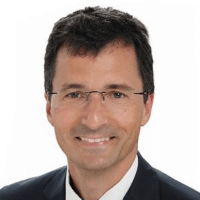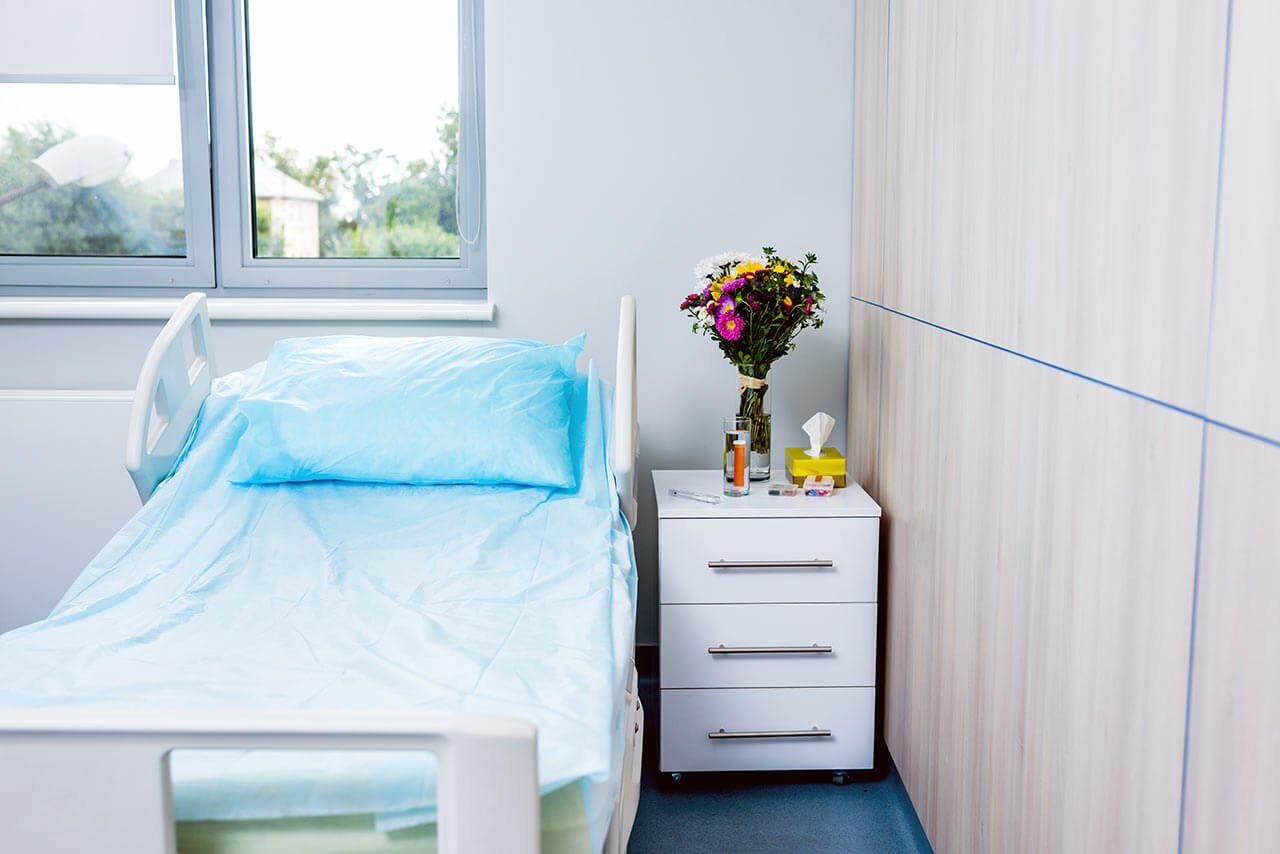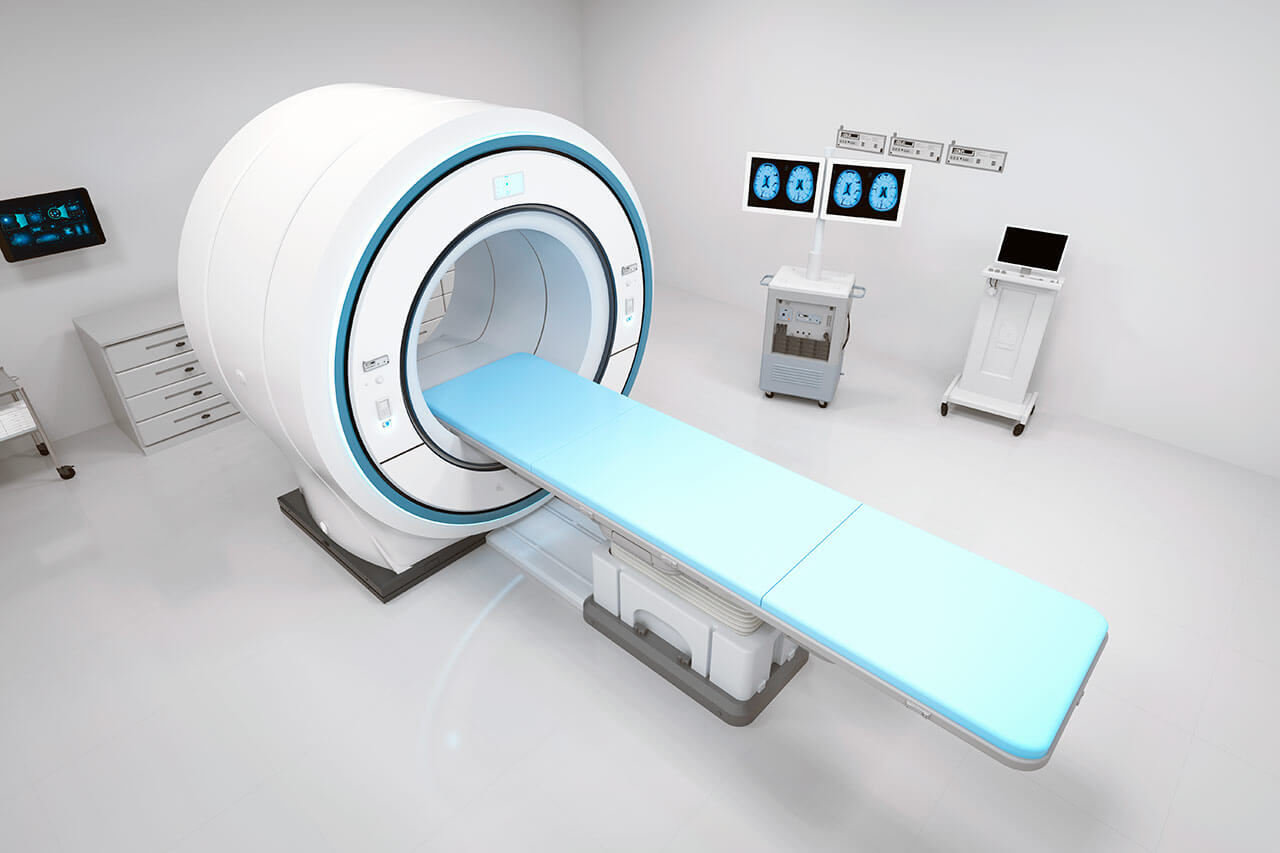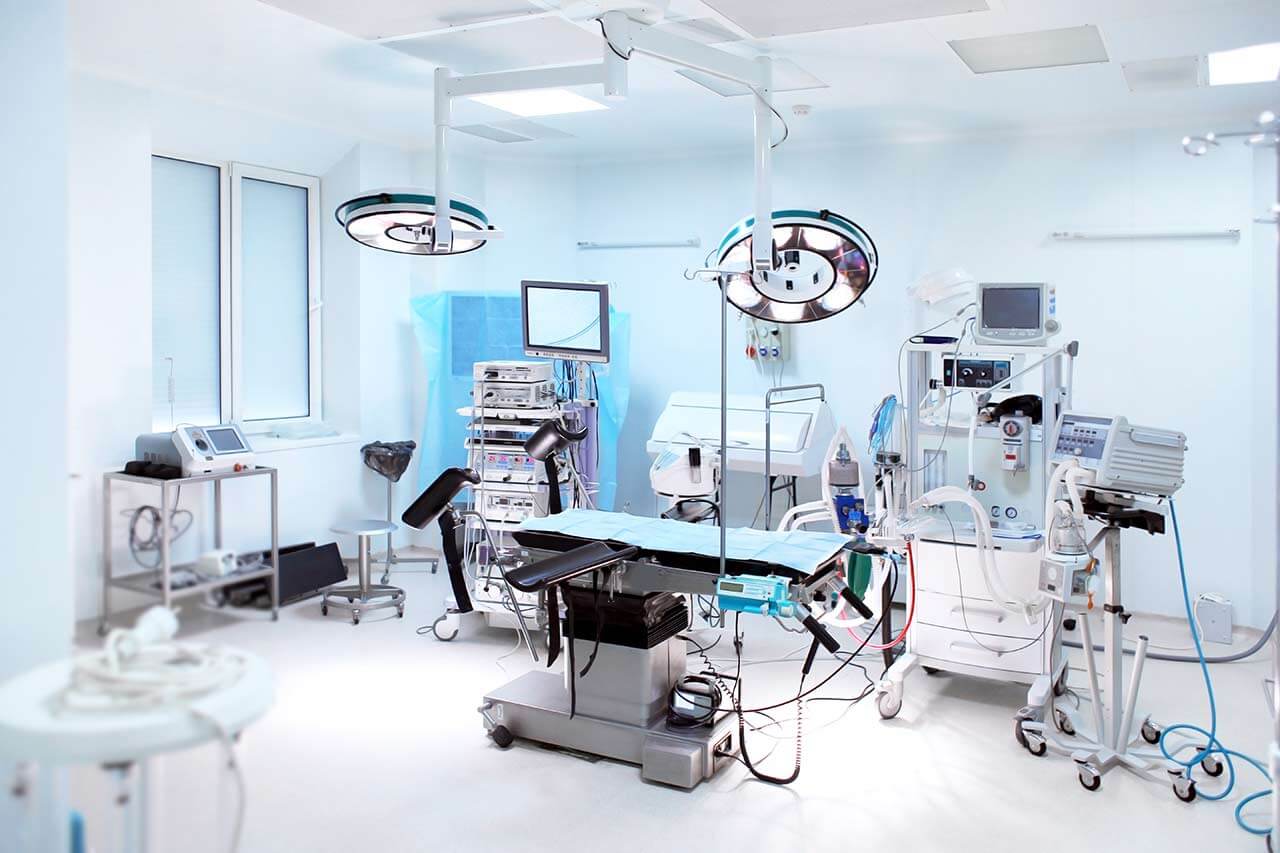
The program includes:
- Initial presentation in the hospital
- Clinical history taking
- Evaluating the available medical reports
- General clinical examination
- Urological examination
- Laboratory tests:
- Complete blood count
- Biochemical analysis of blood
- Inflammation indicators (CRP, ESR)
- Indicators of blood coagulation
- Tumor markers, PSA
- Ultrasound scan of the urogenital system
- CT scan/MRI of the abdomen and pelvis
- Preoperative care
- Nerve-sparing da Vinci prostatectomy
- Histological and immunohistochemical examination of removed tissues
- Removal of prostate tumor metastases with a gamma probe
- Consultations of related specialists
- Symptomatic treatment
- Cost of essential medicines
- Nursing services
- Control examinations
- Stay in the hospital with full board
- Accommodation in 2-bedded ward
- Recommendations regarding further treatment
Indications
Confirmed prostate cancer with suspected or confirmed metastasizing
How program is carried out
During the first visit, the physician will conduct a clinical examination and go through the results of the available examinations. After that, you will undergo the necessary additional examination, such as the assessment of liver and kidney function, ultrasound scan of the abdominal and pelvic organs, CT scan/MRI. Based on the results, the physician will determine the number and localization of metastases, and plan the upcoming intervention.
On the eve of the intervention, you will receive an injection of radioactively labeled PSMA. PSMA is the substance that binds to the smallest prostate cancer metastases in the lymph nodes and other tissues. The radioactive label will allow the surgeon to find all the metastases during the operation.
Robot-assisted prostatectomy with removal of prostate tumor metastases with a gamma probe starts with general anesthesia. After anesthesia, the surgeon makes small incisions through which he inserts endoscopic instruments, a gamma probe and a video camera into the pelvic cavity and abdominal cavity. With the help of manipulators, the surgeon ligates the large vessels of the small pelvis, isolates the nerve endings, excises and removes the prostate gland. The gamma probe detects the lymph nodes affected by metastases by a radioactive label, and the surgeon also removes them endoscopically.
The video camera continuously transmits a three-dimensional image of the operating field in 12-fold magnification to the monitor. As the surgeon sees the operating field in multiple magnification, he preserves the nerve endings and large blood vessels. This significantly reduces the surgical risks. The gamma probe, in turn, allows detecting and removing all metastases, which minimizes the risk of prostate cancer recurrence. The da Vinci prostatectomy is the most sparing type of surgical prostate removal.
After the completion of the operation, you will be transferred back to the ward, under the supervision of the attending physician and nursing staff. Due to the minimal invasiveness of the operation and the short duration of general anesthesia, you will not need to stay in the intensive care unit for a long time. Your urinary catheter will be removed one day after the surgery.
Finally, the attending physician will evaluate the results of control examinations, schedule the date of discharge from the hospital and give you detailed recommendations for further follow-up and treatment.
Required documents
- Medical records
- PSA blood test
- MRI/CT scan (not older than 3 months)
- Bone scintigraphy (if available)
- Biopsy results (if available)
Service
You may also book:
 BookingHealth Price from:
BookingHealth Price from:
About the department
The Department of Adult and Pediatric Urology, Andrology at the University Hospital Giessen UKGM offers the full range of diagnostic and therapeutic services for patients with pathologies of the genitourinary system, including andrological disorders. The department has 47 beds for inpatient treatment. The department annually serves more than 2,300 inpatients and about 1,300 outpatients. The medical team of the department consists of highly qualified employees who have a perfect command of classical and innovative therapeutic methods, thanks to which they achieve high rates of treatment success. The department is headed by Prof. Dr. med. Florian Wagenlehner.
In the treatment of oncological diseases of the urological spectrum, the department uses organ-preserving, minimally invasive, laparoscopic and radical surgical techniques. All therapeutic measures correspond to the very latest relevant achievements of oncological therapy and are prescribed to patients within the framework of interdisciplinary tumor boards.
Key attention is paid to endoscopic treatments. Laser therapy is mainly used to treat benign prostatic hyperplasia, bladder ulcers. In bladder cancer, the standard treatment option is fluorescent surgical resection of the tumor. In addition, endoscopic laser therapy is successfully used in kidney stone disease treatment. The department has at its disposal a modern system for extracorporeal shock wave lithotripsy. This technique involves non-invasive fragmentation of stones in the kidneys and ureters using concentrated ultrasound waves, while the remaining stones are excreted naturally in the urine. Ureterorenoscopy, laser lithotripsy and percutaneous nephrolitholapaxia can also be used for treatment.
The department offers all diagnostic tests to identify the causes of infertility in men. It successfully performs surgical interventions to treat infertility. The standard procedures for extracting sperm from the testis or epididymis include microsurgical epididymal sperm aspiration (MESA), testicular sperm extraction (TESE), a combination of these methods, and microscopic testicular extraction of spermatozoa.
An important area of specialization of the department is pediatric urology. In case of congenital malformations of the genitourinary tract, the doctors perform reconstructive operations to eliminate functional disorders. The department performs organ-preserving, as well as radical surgical treatment of all benign and malignant tumors of the genitourinary system in children. The pediatric urologists also specialize in conducting endoscopic procedures, fragmentation of stones using extracorporeal shock wave lithotripsy and laparoscopic interventions.
The department’s range of medical services includes:
- Diagnostics and treatment of urologic cancers
- Prostate cancer
- Testicular cancer
- Bladder cancer
- Kidney cancer
- Penile cancer
- Laparoscopic surgery
- Testicular search in case of undescended testis in adults and children
- Radical resection of the lymph nodes in stage I of nonseminomatous testicular tumors or after chemotherapy in case of residual retroperitoneal tumors
- Removal of lymph nodes in the pelvic area
- Adrenalectomy
- Kidney removal due to malignancies
- Partial kidney resection in small tumors
- Fenestration or removal of kidney cysts
- Fenestration for lymphocele
- Plastic reconstructive interventions for renal pelvis stenosis
- Radical prostatectomy for prostate cancer
- Kidney removal in contracted kidney
- Endoscopic procedures
- Treatment of benign prostatic hyperplasia
- Treatment of kidney stone disease
- Extracorporeal shock wave lithotripsy
- Ureterorenoscopy
- Laser lithotripsy
- Percutaneous nephrolitholapaxia
- Diagnostics and treatment of prostatitis
- Diagnostics and treatment of urinary incontinence in men and women
- Diagnostics
- Blood test
- Urinalysis
- Ultrasound scanning
- Cystoscopy
- Bladder pressure measurement
- X-ray examination of the bladder and intestines
- Dynamic magnetic resonance imaging
- Measurement of pelvic floor muscle activity
- Urodynamic studies
- Therapy
- Exercise to strengthen the pelvic floor muscles
- Drug therapy
- Sacral neurostimulation
- Minimally invasive surgery
- Vaginal interventions
- Endoscopic surgery
- Laparoscopic surgery
- Open operations
- Diagnostics
- Diagnostics and treatment of urologic diseases in children
- Enuresis
- Hydrocele
- Hypospadias
- Recurrent urinary tract infections in boys
- Undescended testicle
- Megaureter
- Renal pelvis stenosis
- Phimosis
- Urolithiasis
- Vesicoureteral reflux
- Wilms' tumor
- Urgent clinical cases
- Diagnostics and treatment of andrologic problems
- Diagnostics and treatment of penile fibromatosis
- Fertility restoration
- Vasovasostomy
- Tubulovasostomy
- Surgical sperm extraction
- Microsurgical epididymal sperm aspiration (MESA)
- Testicular sperm extraction (TESE)
- Combination of MESA and TESE
- Microscopic testicular sperm extraction
- Prosthetics of the penile cavernous body
- Other medical services
Curriculum vitae
Education
- 1987 - 1992 Study of Human Medicine at Ludwig Maximilian University of Munich.
Qualifications
- 01.12.1995 Admission to medical practice, Munich, Ministry of the Federal State of Bavaria.
- 30.08.2001 Board certification in the Urology, Munich, Bavarian Medical Association.
- 08.08.2008 Advanced training (optional) in Tumor Drug Therapy.
- 01.10.2008 Advanced training in Special Urologic Surgery.
Professional Career
- 06.1994 - 11.1995 Intern, Department of Urology, St. Elizabeth Hospital, Straubing.
- 12.1995 - 08.1996 Assistant Physician, Department of Urology, St. Elizabeth Hospital, Straubing.
- 09.1996 - 08.1997 Assistant Physician, Department of Surgery I, St. Elizabeth Hospital, Straubing.
- 09.1997 - 02.1998 Assistant Physician in the Intensive Care Unit at the Department of Surgery, St. Elizabeth Hospital, Straubing.
- 03.1998 - 08.1998 Assistant, Institute of Medical Microbiology, University of Aberdeen, Scotland.
- 09.1998 - 11.1998 Assistant, Institute of Microbiology and Hygiene, University of Regensburg.
- 12.1998 - 05.1999 Assistant Physician in the Intensive Care Unit at the Department of Surgery, St. Elizabeth Hospital, Straubing.
- 06.1999 - 08.1999 Assistant, Institute of Microbiology and Hygiene, University of Regensburg.
- 09.1999 - 08.2001 Assistant Physician, Department of Urology, St. Elizabeth Hospital, Straubing.
- 09.2001 - 10.2006 Senior Physician, Department of Urology, St. Elizabeth Hospital, Straubing.
- 11.2006 - 12.2009 Senior Physician of the Department of Adult and Pediatric Urology, Andrology at the University Hospital Giessen UKGM.
- Since 01.2010 Head of the Department of Adult and Pediatric Urology, Andrology at the University Hospital Giessen UKGM.
Scientific Career
- 02.21.1996 Doctoral thesis defense at the Technical University of Munich.
- 17.05.2006 Habilitation at the Technical University of Munich.
- 31.07.2006 Venia legendi in Urology at the Technical University of Munich.
- 15.12.2008 Habilitation, Justus Liebig University Giessen.
- 15.06.2010 Extraordinary Professorship, Justus Liebig University Giessen.
Photo of the doctor: (c) UKGM - Universitätsklinikum Gießen und Marburg GmbH
About hospital
The University Hospital Giessen UKGM positions itself as an ultramodern medical facility with outstanding quality of medical care. The hospital presents almost all areas of medicine, ranging from ophthalmology to traumatology and dentistry. The priorities of the hospital’s activities include surgery, neurosurgery, oncology, nephrology with kidney transplantation and pediatric medicine.
The hospital is the third largest in Germany. Every year, more than 436,000 patients are treated in two locations of the hospital (Giessen and Marburg): 342,000 outpatients and 94,000 inpatients. The medical facility is the first privatized university hospital in the country.
The hospital staff is engaged not only in clinical practice, but also in research activities on the basis of the Faculty of Medicine at Justus Liebig University Giessen and Philipps University of Marburg, which contributes to a significant contribution to the development of modern medicine. During the many years of productive work on the development of new diagnostic and treatment methods, the hospital’s doctors managed to make many significant discoveries.
The hospital enjoys an excellent reputation in Germany and far beyond its borders. It managed to gain such credibility thanks to the high competence of doctors, advanced equipment, high-quality medical service and care.
Photo: (c) depositphotos
Accommodation in hospital
Patients rooms
The patients of the University Hospital Giessen UKGM live in comfortable rooms made in a modern design and light colors. Each room has an ensuite bathroom with shower and toilet. The standard room furnishing includes an automatically adjustable bed, a bedside table, a wardrobe, a table and chairs for receiving visitors, a TV, a telephone.
Meals and Menus
The patients of the hospital are offered balanced, healthy three meals a day: buffet breakfast, lunch and dinner. The private kitchen, certified according to DIN EN ISO 9001:2000, is responsible for providing patients with food and drinks.
If for some reason you do not eat all foods, you will be offered an individual menu. The hospital also has a cafeteria with a large assortment of hot and cold drinks, snacks and desserts.
Further details
Standard rooms include:
Television
All patient rooms are equipped with TV sets. If you have some questions, please contact medical personnel.
Religion
Religious services can be provided upon request.
Accompanying person
During an inpatient program, an accompanying person can stay with you in a patient room or in a hotel of your choice.
Hotel
During the outpatient program, you can stay at the hotel of your choice. Our managers will help you to choose the most suitable option.




